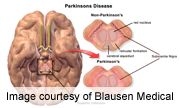Article
Transdermal Delivery of Dopaminergic Parkinson's Disease Medication May Improve Gastrointestinal Symptoms
Author(s):
Switching from oral administration of the non-ergoline dopamine agonist, rotigotine, to a transdermal delivery system may improve gastrointestinal symptoms for patients with Parkinson's disease.

Switching from oral administration of the non-ergoline dopamine agonist, rotigotine, to a transdermal delivery system may improve gastrointestinal (GI) symptoms for patients with Parkinson's disease (PD) and existing GI symptoms, according to research presented at the 65th Annual Meeting of the American Academy of Neurology.
For patients with PD, GI symptoms are common and significantly affect quality of life. Commonly reported GI symptoms in PD patients include abnormal salivation, dysphagia, nausea, constipation, and defecatory dysfunction. As these symptoms tend to correlate with disease severity, it suggests that they reflect direct involvement of the primary disease process in the enteric system. However, some researchers have also proposed that stimulation of D2 dopaminergic neurons in the gastrointestinal tract or central effects of dopaminergic stimulation may also contribute to the development of GI symptoms in patients with PD. One way of potentially reducing the possible direct effects of dopaminergic stimulation on the GI tract could include a different route of PD drug administration.
Dirk Woitalla, MD, of St. Joseph's Hospital University Clinic in Germany, and colleagues conducted a noninterventional observational study in a routine daily clinical practice setting to evaluate the efficacy and safety of switching 58 patients with PD who were experiencing GI symptoms, including heartburn, bloating, nausea, vomiting, abdominal pain, and diarrhea, from oral treatment with rotigotine to transdermal rotigotine. Primary efficacy endpoints included patient-rated change in the intensity of GI complaints, measured on a scale of 0-100 mm; the total score rating 6 separate GI complaints (each item rated from 0-12 for a total score of 72); and patient satisfaction with GI symptom improvement.
After six weeks of treatment with transdermal rotigotine, the intensity of GI complaints improved from baseline by an average of 27.8 mm, as measured on a visual analogue scale (baseline: 47.5 ± 24.4 mm; endpoint: 19.7 ± 23.3 mm). Additionally, the sum of GI complaints were reduced by 9.1 points from baseline (baseline: 11.2±9.0; endpoint: 2.1±4.4). Finally, 86% (50/58 patients) reported that they were either satisfied or very satisfied with their improvement in GI symptoms after six weeks of treatment with transdermal rotigotine.
“Although further study is required, this study suggests that switching from oral PD medication to transdermal dopaminergic therapy with rotigotine may improve pre-existing GI symptoms in patients with PD. An ongoing double-blind trial investigating the effects of the rotigotine transdermal system on GI motility will investigate this further, but preliminary results are promising,” the authors concluded.
This study was supported by UCB Pharma.




